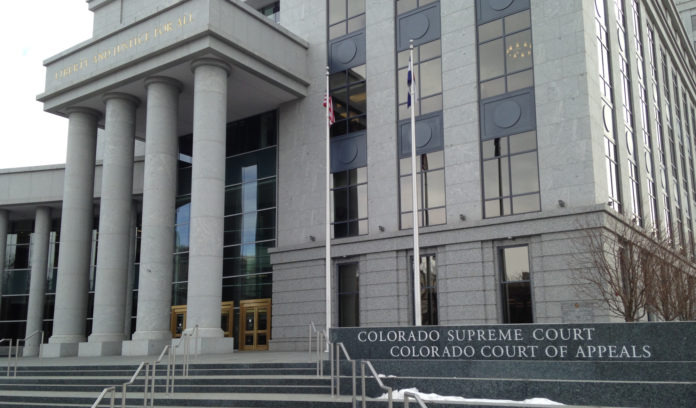
The Colorado Supreme Court will hear oral arguments in two cases on Tuesday. In the first, the court will consider whether a hospital admission form requiring a patient to pay “all charges” of the hospital meant the patient agreed to pay the hospital’s chargemaster rates. For the patient, the court’s decision could determine whether she owes the hospital nearly $230,000 or less than $1,000.
In the second case, the court will consider whether four Colorado truck drivers are “interstate drivers” — and therefore ineligible for overtime pay — under state wage-and-hour laws.
French v. Centura
Lisa French went to Centura Health-St. Anthony North for elective spinal surgery in 2014. The hospital told her she would personally owe just over $1,300 for the procedures and asked her to sign a Hospital Services Agreement, which required her to pay “all charges of the Hospital.” But following the procedures, French’s bill for the two surgeries totaled more than $300,000. Her insurance covered about $73,600 of the total, leaving her on the hook for nearly $230,000.
The hospital’s bill was based on its chargemaster, a list of billable items that usually reflects inflated rates far higher than what most patients or insurance providers end up paying. The chargemaster wasn’t referenced in the services agreement French signed nor were the chargemaster prices disclosed to French before the procedure.
French refused to pay the bill and the hospital sued her, leading to a jury trial. The jury determined the hospital’s reference to “all charges” meant the “reasonable value” of goods and services provided, rather than the chargemaster rates. The jury concluded the amount charged based on the chargemaster was unreasonable and that French owed the hospital an additional $776.74 — not the six-figure sum the hospital said she owed.
The Colorado Court of Appeals reversed, finding that the hospital’s price term in the signed agreement with French “unambiguously referred to its chargemaster rates” and was “sufficiently definite to be enforceable.”
In her appeal to the state Supreme Court, French argues the Court of Appeals’ decision runs contrary to settled contract law because the agreement didn’t incorporate the chargemaster by reference. She also argues the Court of Appeals incorrectly held that incorporating the chargemaster made the agreement unambiguous, even though the hospital admitted during trial the chargemaster would be incomprehensible to the average patient.
“Prior to the Court of Appeals’ Opinion, Colorado law provided for a reasonable price in the absence of a price term, with no undue burden on either the judiciary or Colorado hospitals,” French states in her opening brief. “Instead of relying on this well-settled precedent, the Court of Appeals gave Colorado healthcare providers a blank check to unilaterally impose objectively unreasonable bills on uninsured and so-called ‘out-of-network’ patients.”
The hospital argues that according to standard health care industry practices, “all charges” means the chargemaster rates. It contends that service agreements can’t state a dollar price prior to surgery since hospitals can’t predict in advance the services and supplies a patient will need. French also failed to read the contract, the hospital says. According to the hospital, if the Court of Appeals’ decision is overruled, jury trials will be required to decide the “reasonable value” of each patient’s treatment.
“The implications of rejecting the majority rule are staggering: tens of thousands of patient-hospital contracts entered in Colorado every year are all ambiguous and include a ‘reasonable value’ term inserted by courts, and determined by a jury,” states the answer brief from Centura Health and Catholic Health Initiatives. “Such a rule will strip hospitals of the ability to set their own prices and formulate a financial plan for economic survival in an environment where Medicare/Medicaid reimbursement rates do not cover the hospital’s costs.”
Gomez et al v. JP Trucking
Leonel Gomez, Francisco Gonzalez, Ebarardo Sanchez and Nathan Abbott drove trucks for a living. They mostly delivered materials to construction sites within the state of Colorado, but Abbott and Gonzalez had to cross state lines on one occasion.
The four drivers often worked more than 40 hours a week. They took their employer, JP Trucking, to court for failure to pay overtime. JP Trucking argued the workers were exempt under the Colorado Minimum Wage Order’s exemption for “interstate drivers” and the Motor Carrier Act exemption under the Fair Labor Standards Act, which says federal overtime requirements don’t apply to drivers whose duties involve transporting goods in interstate commerce. The trial court found neither exemption applied and ruled in favor of the workers.
JP Trucking appealed. Following briefing, the Colorado Court of Appeals remanded the case for additional findings of fact. The trial court reversed its ruling on the FLSA, finding the workers were exempt from overtime pay under the MCA exemption, but concluded they were not exempt under the CMWO.
The case then went back to the Court of Appeals, which considered whether “interstate driver,” which is undefined in the CMWO, has the same meaning as an employee covered under the MCA exemption, which does not require drivers to cross state lines. The Court of Appeals division concluded that the CMWO’s “interstate drivers” exemption “mirrors the MCA exemption in scope” and reversed the judgment in favor of JP Trucking. In doing so, it declined to follow another division’s 2018 holding in Brunson v. Colorado Cab Company, which found the interstate drivers exemption only applied to drivers whose work takes them across state lines.
The Colorado Supreme Court will consider whether the Court of Appeals erred in departing from the Brunson decision and in finding that the interstate drivers exemption was unambiguous due to its similarities with the MCA exemption, despite contrary guidance from the Colorado Department of Labor and Employment.

